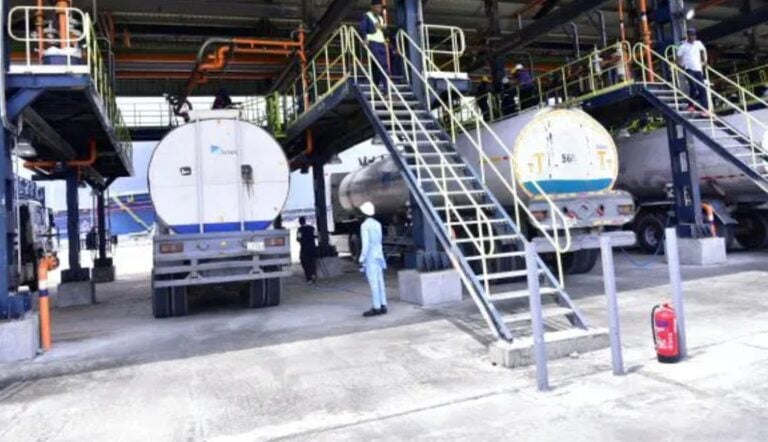Nigeria’s downstream oil sector has once again been thrust into the spotlight following growing disputes between refinery operators, petroleum marketers, and truck drivers’ unions over the future of the country’s refining revolution. While one camp warns against monopoly and unfair practices, another is calling for restraint, negotiation, and collaboration to protect the nation’s fragile economic recovery.
Reacting to this, the Crude Oil Refiners Association of Nigeria urged the Depot and Petroleum Products Marketers Association of Nigeria to embrace cooperation with domestic refineries, stressing that the ongoing bickering with the Dangote Petroleum Refinery could derail the country’s historic shift toward local refining.
In a statement signed by its Publicity Secretary, Eche Idoko, CORAN expressed concern over the accusations by DAPPMAN that the Dangote refinery was deliberately reducing petrol prices to edge out competitors. The Dangote Group dismissed the claims as misleading.
CORAN cautioned that while competition in the marketplace is healthy, the tone of the disagreement risks distracting the country from a much bigger opportunity—the chance to finally achieve self-sufficiency in refined petroleum products.
“For decades, Nigeria endured the paradox of being Africa’s leading crude oil producer yet depending on imports for most of its refined petroleum products. This drained scarce foreign exchange, enriched foreign refiners, and entrenched middlemen structures,” the group stated.
According to CORAN, Nigeria now stands at the cusp of a refining revolution. The commissioning of large-scale projects like the Dangote Refinery, alongside multiple modular refineries springing up across the country, represents “the foundation of a new economic windfall.”
However, the association said stakeholders, particularly depot owners and tank farm operators, must understand that the rise of domestic refining has upended the old import-dependent model that sustained their businesses for decades.
“The rise of domestic refining poses an inherent threat to the old import-dependent business model that sustained depots and bulk marketers for decades. But rather than see this as extinction, CORAN urges tank farm owners and marketers to embrace collaboration with local refineries to ensure their continued relevance,” it said.
The group emphasised that no refinery, whether mega facilities like Dangote’s or modular plants, can thrive without efficient evacuation, storage, and distribution networks—roles that marketers and depot operators are strategically positioned to play.
By repositioning themselves as partners handling logistics, regional distribution, storage, and last-mile delivery, DAPPMAN members could reinvent their businesses for the new domestic-focused era.
CORAN acknowledged the critical role marketers played for decades by ensuring petroleum products reached Nigerians despite global supply shocks, but stressed that the new refineries also deserve support for helping Nigeria reduce forex pressure, create jobs, and stabilise prices.
“What Nigeria cannot afford is for either side’s vested interest to derail the refining renaissance now unfolding. The path forward is clear: collaboration, not confrontation,” CORAN declared.
Meanwhile, political leaders are also wading into another layer of dispute surrounding the Dangote Refinery—this time with the Nigeria Union of Petroleum and Natural Gas Workers and the Direct Trucking Company Drivers Association.
Senator Steve Karimi, representing Kogi West Senatorial District, on Thursday urged the unions to negotiate mutually beneficial agreements with the Dangote refinery instead of resorting to industrial action and disruption. His intervention followed a court order restraining NUPENG and truck drivers from blocking roads or frustrating operations at Dangote refinery, MRS Oil Nigeria Limited, and MRS Oil and Gas Company Limited.
Karimi described the refinery as a blessing to Nigeria’s economy, warning that attempts to shut down its operations would reverse the progress achieved since the Federal Government removed fuel subsidies and supported local refining.
“The subsidy removal by the Federal Government is now yielding positive economic impacts, partly because of the coming on board of Dangote Refinery. We need to join hands together to encourage its smooth operation,” he said.
He noted that despite billions of naira invested by previous governments in rehabilitating the state-owned refineries, none of them is functional. In contrast, the Dangote Refinery has already reduced Nigeria’s reliance on fuel imports, while contributing to the naira’s strengthening in the foreign exchange market.
Karimi also commended President Bola Tinubu for creating an enabling environment by ensuring crude oil sales to local refineries under negotiated agreements that benefit both producers and refiners.
The senator, however, appealed to NUPENG and truck drivers to channel their grievances into constructive negotiations rather than protests that would harm not only Dangote but also millions of Nigerians who depend on an affordable and stable fuel supply.
“This effort must be sustained. I urge NUPENG and the Direct Trucking Company Drivers Association to negotiate a deal with Dangote rather than embarking on any industrial action, compelling other truck drivers to join,” he said.
The dual calls—for marketers to align with domestic refineries and for unions to prioritise negotiation over disruption—underline the fragile balance Nigeria must maintain as it transitions from a decades-old dependence on imports to a self-sufficient refining economy.
Industry watchers warn that the stakes could not be higher. If collaboration replaces rivalry, Nigeria could unlock lower fuel prices, job creation, and forex savings. If disputes persist, the refining revolution could stall before it gains momentum.
As CORAN concluded in its statement: “Nigeria cannot afford to miss this historic opportunity. The refining sector must be nurtured as the engine of economic transformation—not suffocated on the altar of rivalry.”
Stay ahead with the latest updates!
Join The Podium Media on WhatsApp for real-time news alerts, breaking stories, and exclusive content delivered straight to your phone. Don’t miss a headline — subscribe now!
Chat with Us on WhatsApp






